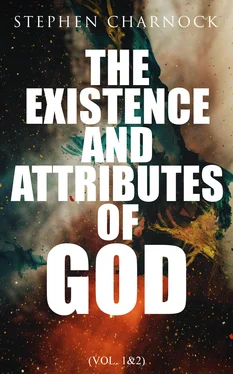Stephen Charnock - The Existence and Attributes of God (Vol. 1&2)
Здесь есть возможность читать онлайн «Stephen Charnock - The Existence and Attributes of God (Vol. 1&2)» — ознакомительный отрывок электронной книги совершенно бесплатно, а после прочтения отрывка купить полную версию. В некоторых случаях можно слушать аудио, скачать через торрент в формате fb2 и присутствует краткое содержание. Жанр: unrecognised, на английском языке. Описание произведения, (предисловие) а так же отзывы посетителей доступны на портале библиотеки ЛибКат.
- Название:The Existence and Attributes of God (Vol. 1&2)
- Автор:
- Жанр:
- Год:неизвестен
- ISBN:нет данных
- Рейтинг книги:3 / 5. Голосов: 1
-
Избранное:Добавить в избранное
- Отзывы:
-
Ваша оценка:
- 60
- 1
- 2
- 3
- 4
- 5
The Existence and Attributes of God (Vol. 1&2): краткое содержание, описание и аннотация
Предлагаем к чтению аннотацию, описание, краткое содержание или предисловие (зависит от того, что написал сам автор книги «The Existence and Attributes of God (Vol. 1&2)»). Если вы не нашли необходимую информацию о книге — напишите в комментариях, мы постараемся отыскать её.
The Existence and Attributes of God (Vol. 1&2) — читать онлайн ознакомительный отрывок
Ниже представлен текст книги, разбитый по страницам. Система сохранения места последней прочитанной страницы, позволяет с удобством читать онлайн бесплатно книгу «The Existence and Attributes of God (Vol. 1&2)», без необходимости каждый раз заново искать на чём Вы остановились. Поставьте закладку, и сможете в любой момент перейти на страницу, на которой закончили чтение.
Интервал:
Закладка:
Reason II. We cannot else act towards God according to the nature of rational creatures. Spiritual worship is due to God, because of his nature; and due from us, because of our nature. As we are to adore God, so we are to adore him as men; the nature of a rational creature makes this impression upon him; he cannot view his own nature without having this duty striking upon his mind. As he knows, by inspection into himself, that there was a God that made him; so, that he is made to be in subjection to God, subjection to him in his spirit as well as his body, and ought morally to testify this natural dependence on him. His constitution informs him that he hath a capacity to converse with God; that he cannot converse with him, but by those inward faculties; if it could be managed by his body without his spirit, beasts might as well converse with God as men. It can never be a “reasonable service” (Rom. xii. 1), as it ought to be, unless the reasonable faculties be employed in the management of it; it must be a worship prodigiously lame, without the concurrence of the chiefest part of man with it. As we are to act conformably to the nature of the object, so also to the nature of our own faculties. Our faculties, in the very gift of them to us, were destined to be exercised, about what? What? All other things but the Author of them. It is a conceit cannot enter into the heart of a rational creature, that he should act as such a creature in other things, and as a stone in things relating to the donor of them; as a man, with his mind about him in the affairs of the world; as a beast, without reason in his acts towards God. If a man did not employ his reason in other things, he would be an unprofitable creature in the world: if he do not employ his spiritual faculties in worship, he denies them the proper end and use for which they were given him; it is a practical denial that God hath given him a soul, and that God hath any right to the exercise of it. If there were no worship appointed by God in the world, the natural inclination of man to some kind of religion would be in vain; and if our inward faculties were not employed in the duties of religion they would be in vain; the true end of God in the endowment of us with them would be defeated by us, as much as lies in us, if we did not serve him with that which we have from him solely at his own cost. As no man can with reason conclude, that the rest commanded on the Sabbath and the sanctification of it, was only a rest of the body, that had been performed by the beasts as well as men, but some higher end was aimed at for the rational creature; so no man can think that the command for worship terminated only in the presence of the body; that God should give the command to man as a reasonable creature, and expect no other service from him than that of a brute. God did not require a worship from man for any want he had, or any essential honor that could accrue to him, but that men might testify their gratitude to him, and dependence on him. It is the most horrid ingratitude not to have lively and deep sentiments of gratitude after such obligations, and not to make those due acknowledgments that are proper for a rational creature. Religion is the highest and choicest act of a reasonable creature; no creature under heaven is capable of it that wants reason. As it is a violation of reason not to worship God, so it is no less a violation of reason not to worship him with the heart and spirit; it is a high dishonor to God, and defeats him not only of the service due to him from man, but that which is due to him from all the creatures. Every creature, as it is an effect of God’s power and wisdom, doth passively worship God; that is, it doth afford matter of adoration to man that hath reason to collect it, and return it where it is due. Without the exercise of the soul, we can no more hand it to God, than without such an exercise, we can gather it from the creature; so that by this neglect, the creatures are restrained from answering their chief end; they cannot pay any service to God without man; nor can man, without the employment of his rational faculties, render a homage to God, any more than beasts can. This engagement of our inward power stands firm and inviolable, let the modes of worship be what they will, or the changes of them by the sovereign authority of God never so frequent; this could not expire or be changed as long as the nature of man endured. As man had not been capable of a command for worship, unless he had been endued with spiritual faculties; so he is not active in a true practice of worship, unless they be employed by him in it. The constitution of man makes this manner of worship perpetually obligatory, and the oblation can never cease, till man cease to be a creature furnished with such faculties; in our worship, therefore, if we would act like rational creatures, we should extend all the powers of our souls to the utmost pitch, and essay to have apprehensions of God, equal to the excellency of his nature, which, though we may attempt, we can never attain.
Reason III. Without this engagement of our spirits no act is an act of worship. True worship, being an acknowledgment of God and the perfections of his nature, results only from the soul, that being only capable of knowing God and those perfections which are the object and motive of worship. The posture of the body is but to testify the inward temper and affection of the mind; if, therefore, it testifies what it is not, it is a lie, and no worship; the cringes a beast may be taught to make to an altar may as well be called worship, since a man thinks as little of that God he pretends to honor, as the beast doth of the altar to which he bows. Worship is a reverent remembrance of God, and giving some honor to him with the intention of the soul; it cannot justly have the name of worship, that wants the essential part of it; it is an ascribing to God the glory of his nature, an owning subjection and obedience to him as our sovereign Lord; this is as impossible to be performed without the spirit, as that there can be life and motion in a body without a soul; it is a drawing near to God, not in regard of his essential presence, so all things are near to God, but in an acknowledgment of his excellency, which is an act of the spirit; without this, the worst of men in a place of worship are as near to God as the best. The necessity of the conjunction of our soul ariseth from the nature of worship, which being the most serious thing we can be employed in, the highest converse with the highest object requires the choicest temper of spirit in the performance. That cannot be an act of worship, which is not an act of piety and virtue; but there is no act of virtue done by the members of the body, without the concurrence of the powers of the soul. We may as well call the presence of a dead carcass in a place of worship, an act of religion, as the presence of a living body without an intent spirit; the separation of the soul from one is natural, the other moral; that renders the body lifeless, but this renders the act loathsome to God; as the being of the soul gives life to the body, so the operation of the soul gives life to the actions. As he cannot be a man that wants the form of a man, a rational soul; so that cannot be a worship that wants an essential part, the act of the spirit; God will not vouchsafe any acts of man so noble a title without the requisite qualifications (Hos. v. 6): “They shall go with their flocks and their herds to seek the Lord,” &c. A multitude of lambs and bullocks for sacrifice, to appease God’s anger. God would not give it the title of worship, though instituted by himself, when it wanted the qualities of such a service. “The spirit of whoredom was in the midst of them” (v. 4). In the judgment of our Saviour, it is a “vain worship, when the traditions of men are taught for the doctrines of God” (Matt. xv. 9); and no less vain must it be, when the bodies of men are presented to supply the place of their spirits. As an omission of duty is a contempt of God’s sovereign authority, so the omission of the manner of it is a contempt of it, and of his amiable excellency; and that which is a contempt and mockery, can lay no just claim to the title of worship.
Читать дальшеИнтервал:
Закладка:
Похожие книги на «The Existence and Attributes of God (Vol. 1&2)»
Представляем Вашему вниманию похожие книги на «The Existence and Attributes of God (Vol. 1&2)» списком для выбора. Мы отобрали схожую по названию и смыслу литературу в надежде предоставить читателям больше вариантов отыскать новые, интересные, ещё непрочитанные произведения.
Обсуждение, отзывы о книге «The Existence and Attributes of God (Vol. 1&2)» и просто собственные мнения читателей. Оставьте ваши комментарии, напишите, что Вы думаете о произведении, его смысле или главных героях. Укажите что конкретно понравилось, а что нет, и почему Вы так считаете.












